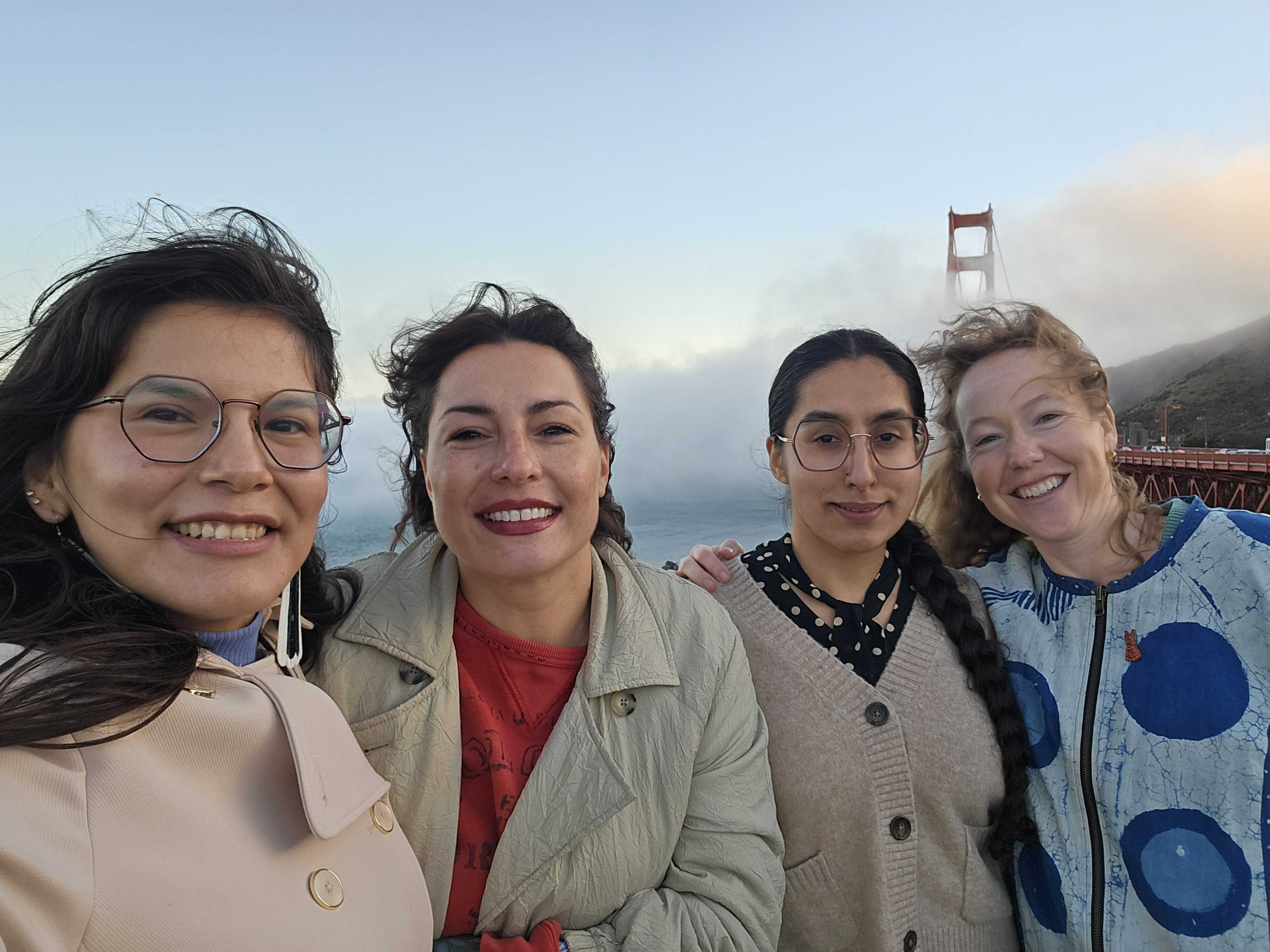
In these times of uncertainty, conflict and rising costs of living, it is important to remember that there is hope for our futures. We (Rayanna Seymour-Hourie, Katłıà Lafferty, Georgia-Lloyd Smith and Navjot Jassar) did just that! In the first week of November, RELAW (Revitalizing Indigenous Law for Land, Air and Water) travelled to a three-day first of its kind Indigenous-led conference on the territory of the Ramaytush Ohlone, in San Francisco, CA.
The conference, Economic Futures: Investing in Indigenous-led Sustainability Solutions, brought together Nation representatives and allies from around the world to learn from one another and hold conversations. Discussions examined sustainability solutions and new pathways for evolving our economies, while confronting the climate and nature crises we face. In other words, this gathering centred our shared economic futures and changes that could benefit the people, land, water and air.
The gathering had three tracks, all interwoven with pathways for actionable change:
- The Roots: Leveraging Current Finance, with presentations and conversations around already available market opportunities like biodiversity credits, green technology, and conservation funds.
- The Branches: Elevating Current Solutions, with emerging ideas evolving us toward Indigenous-led solutions like restoration economies.
- The Stars: Evolving Economic Futures, to discuss what we’re reaching for – economies beyond extraction, exploring what’s possible for conservation, climate or sustainability investments.
The gathering began with a warm welcome and land acknowledgement delivered by Gregg Castro, recognizing that we were on the traditional territory of the Ramaytush Ohlone. Opening remarks by organizers Gwen Bridge, James Rattling Leaf, Sr. and Heather Tallis followed, setting the tone for the entire conference.
The following are some of the Economic Futures highlights shared by the RELAW Team:
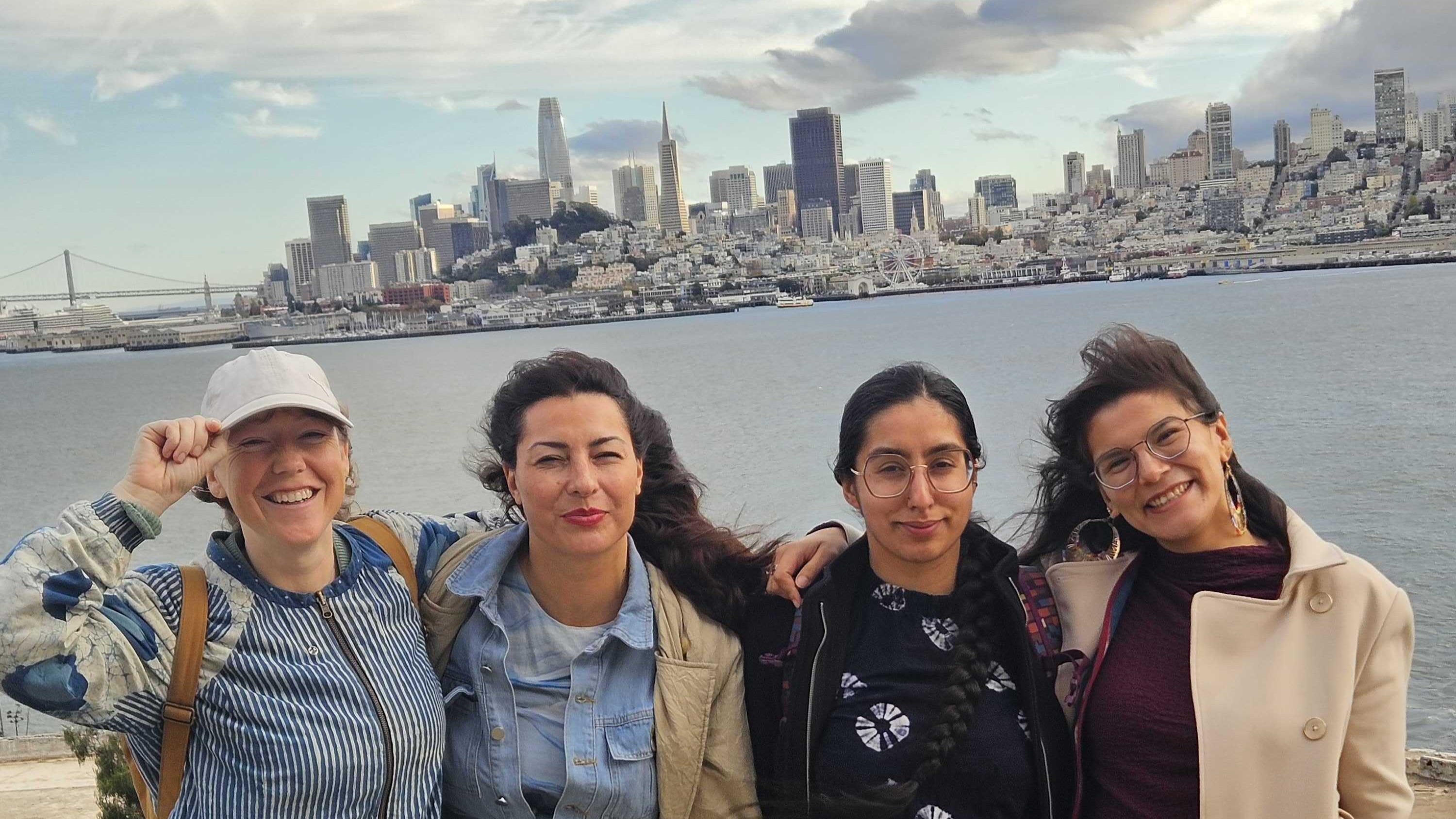
From L-R: Georgia Lloyd-Smith, Katłıà Lafferty, Navjot Jassar and Rayanna Seymour-Hourie
Georgia, Staff Lawyer, was captivated by the words of Corrina Gould, Tribal Chair of the Confederated Villages of Lisjan:
“Everyday I wake up and pray for the end of capitalism.”
These were the opening words of Corrina, who then went on to share the amazing work she is leading to rematriate their lands in the heart of San Francisco. Never has it been so apparent that capitalism as we know it is failing us. A select few are getting richer while the rest struggle to afford rising prices while Mother Earth bears the brunt of the greed. This gathering reminds us that Indigenous economies based on abundance, reciprocity and continuous movement of wealth are alive and thriving. As Corrina reminded us,
“There is no word in our language for ‘homeless.’ Our lands are abundant and always provided us with what we needed.”
We don’t have to double down on a system based on delusional ideas of infinite growth, a system that hurts more than it heals. This gathering highlighted how Indigenous economies are already shaping our global economic future and it gave me hope for economic flourishing for the first time in a while.
Rayanna, Staff Lawyer & RELAW Program Lead, walked away feeling hopeful. She shares:
I think sometimes it feels like we are living in an apocalyptic world with ‘natural disasters,’ with the economy becoming harder to maintain and everything getting more expensive. However, it is super important to gather in these ways to ensure that we maintain hope and are reminded that there are many people doing amazing work who are creating, sustaining and ensuring sustainable futures through pushing for local-based decision-making, and creating change in the places where they live.
I learned so much! And have homework and reading to do. I learned about the growing ways and opportunities to invest and finance solutions for nature. I dove deep into the origins of the Red Power movement and how Alcatraz was the birthing place of the American Indian Movement. Throughout history and into our present, I was reminded that there are always leaders working within our existing systems, working on the barriers of them, and working completely outside of them, who have all of our well-being in their minds.
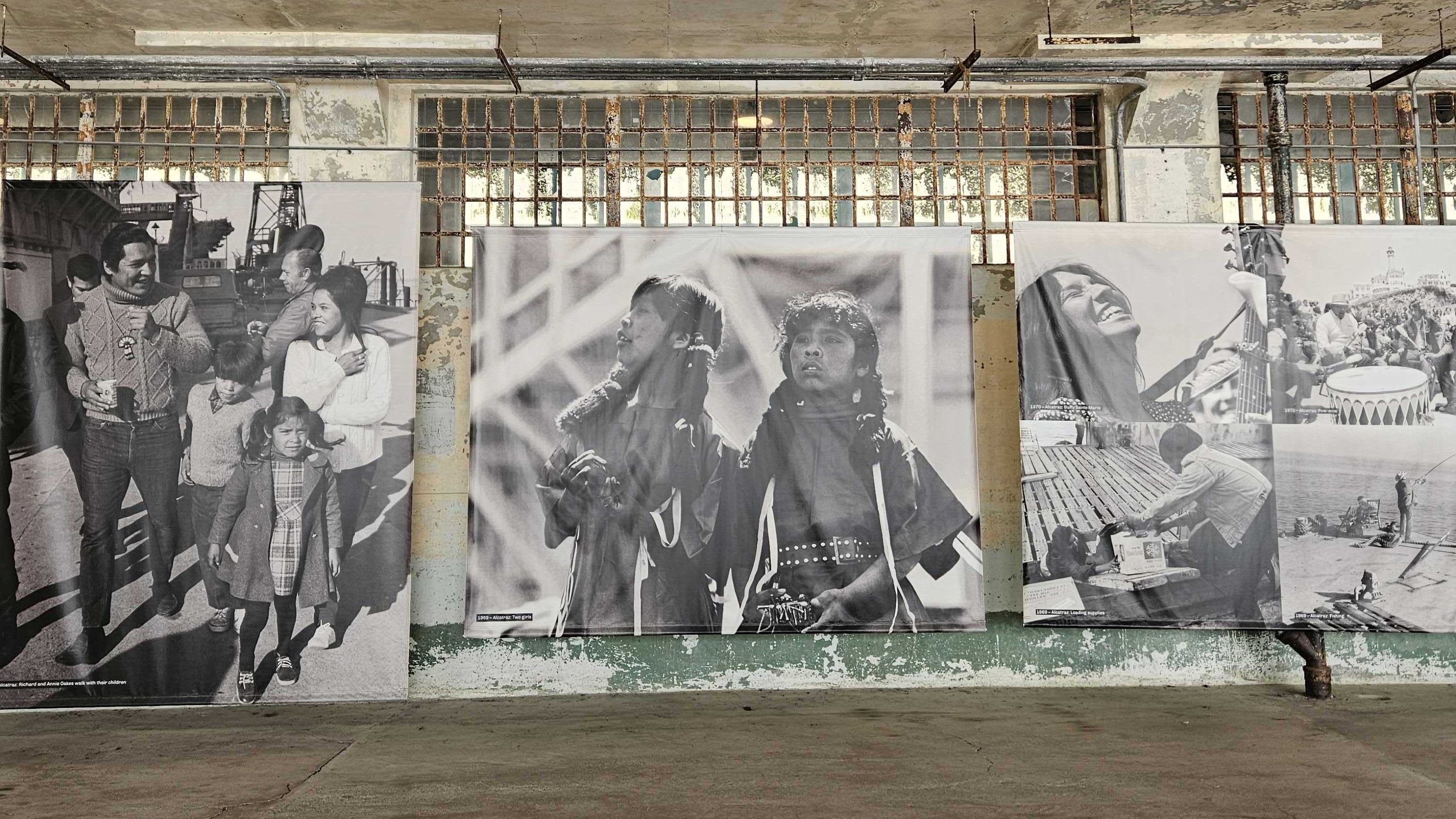
Alcatraz images from 1969-1971
Katłıà Lafferty (she/her), RELAW Co-Learning Manager, left feeling inspired. She shares:
I had the incredible honour of presenting and learning from so many brilliant minds at the inaugural Indigenous Economic Futures Conference in San Francisco. It was truly inspiring to be part of a gathering that brought together Indigenous nations, thinkers, and leaders from across the world, all united in envisioning economic systems grounded in our ancestral teachings and responsibilities.
During our workshop, I was deeply moved to see one of the stories from my own home territory being discussed in groups, where participants sat in circle and drew out the teachings and legal principles. I was humbled by the many fruitful discussions that took place around decision-making found in that story and also the discussions that were held with care when talking about the current economy. It was a powerful reminder that our laws, values, and stories hold timeless guidance – that caring for Mother Earth must always come first, above all else.
Sharing the stage with my amazing colleagues was an honour in itself. Their wisdom, strength, and vision continue to inspire me.
It was also a gift to connect with Indigenous nations from around the globe and to represent Turtle Island in these important conversations about our collective futures and how we plan to go further into the future together applying our unique skills.
I sincerely hope this is just the beginning, that there will be future conferences where we continue to share our stories, histories, and innovations. Just as our ancestors once connected across vast trade routes, exchanging goods, ideas, and relationships, we too must keep building and strengthening those global Indigenous networks today.
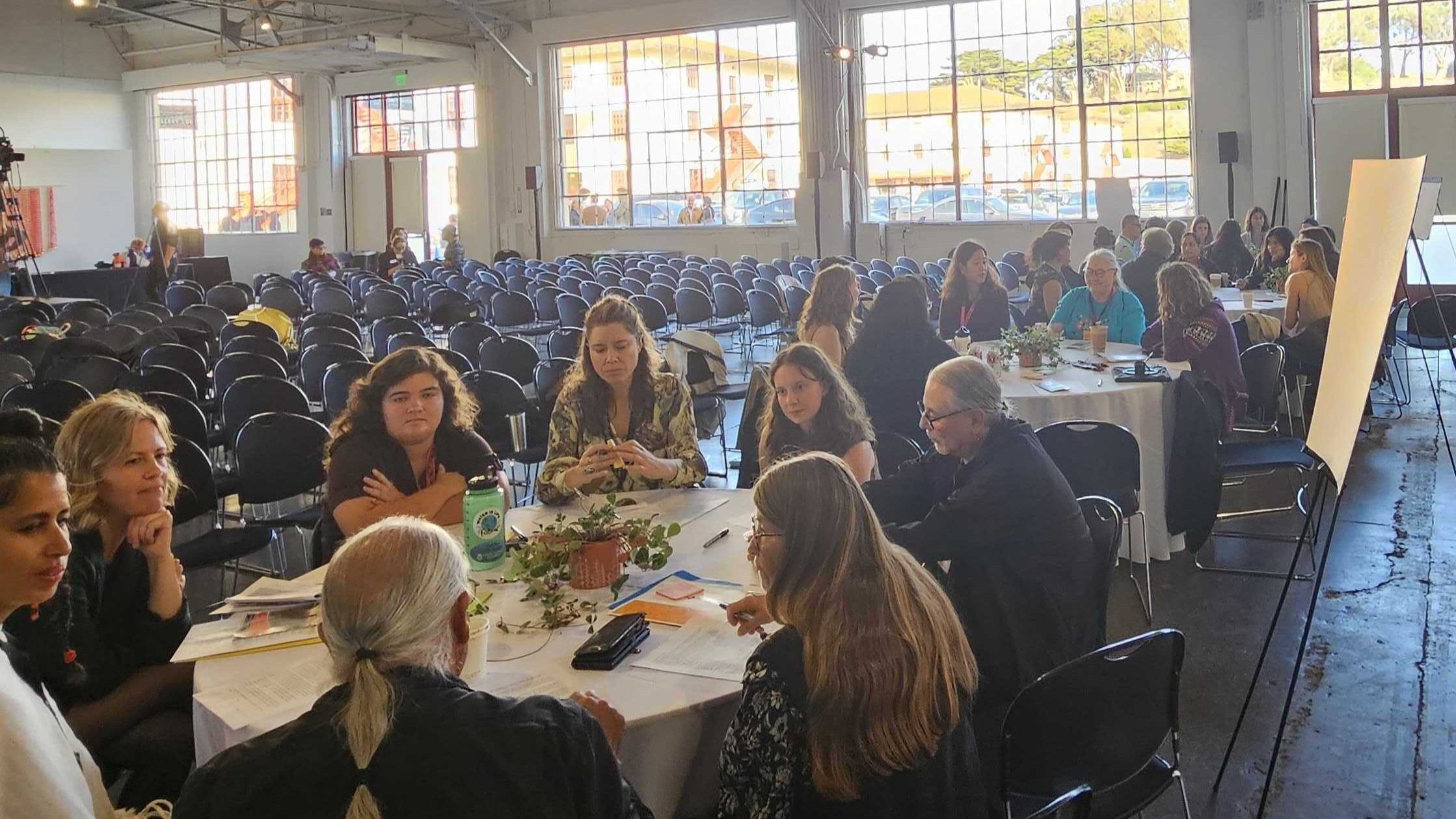
Conference attendees discussing stories
Navjot Jassar, Staff Lawyer, was enthralled in the Lingít storytelling. She shares:
This conference confirmed for me that economies that centre the needs of people, land, water, air and all beyond-human beings already exist and Indigenous peoples across the globe are leading the way in uplifting and regenerating these systems. These visionary economies need meaningful investment from bold and innovative allies, donors and supporters so they can become even stronger and provide more of their benefits for the inhabitants of this world.
The importance of cultivating economies for the future could not be greater. During this gathering, Meda DeWitt shared the origin story of her people, the Lingít, as emerging from the last major climate crisis her people faced and journeying into a new place and a new identity. She reminds us that in today’s environmental crises, we have no place left to go, so we must protect what we have and foster a new economic identity that is not rooted in exploitation and extraction, but in regeneration and reciprocity.
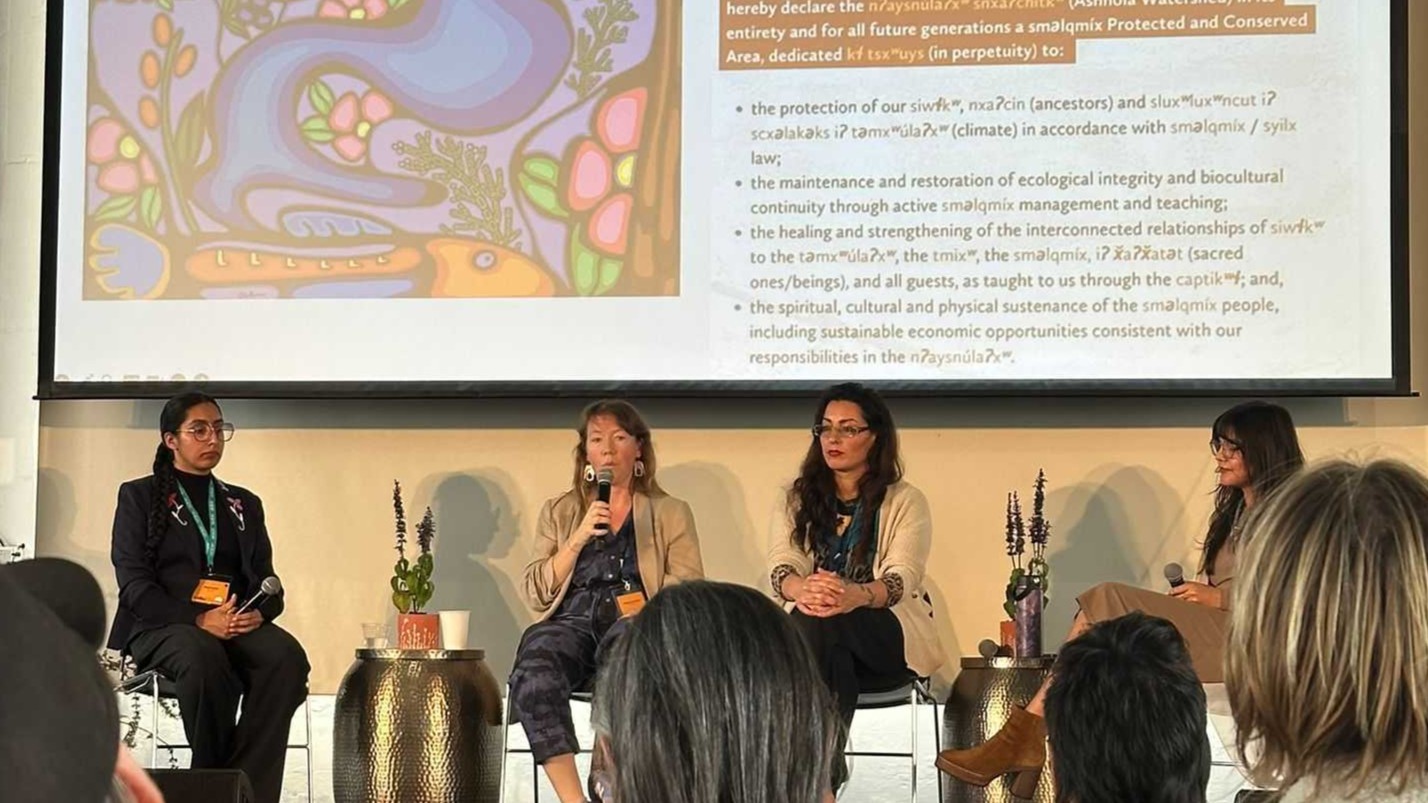
RELAW presentation at Economic Futures
This conference illustrated that centring Indigenous visions around the environment and economy is the future. Dr. Lyla June Johnston described numerous Indigenous technologies that advanced economies and trade, benefitting not only people, but all life forms, including clam gardens, herring roe on hemlock, and cultural burning. These Indigenous technologies underpinned the economy of Nations and Tribes throughout the continent of Turtle Island.
Today, Canada and states around the world are facing economic uncertainty due to tariffs and shifting trade relationships. Tribes and Nations are already challenging the tariff crisis in various ways, such as Indigenous-led sovereign trade initiatives like the Standing Buffalo Economic Corridor.
We see that economic projects grounded in Indigenous principles and values have the potential to benefit all, not only a select few. Take for example, the Graton Resort and Casino, which provides dignified and ethical working conditions for its employees, and tens of millions to support Tribal members and other social causes for the benefit of all society. Or the Champlain Hudson Power Express, championed by Kahsennenhawe Sky-Deer, former Grand Chief of the Mohawk Council of Kahnawà:ke, who made history as the first woman and first two-spirit person to ever be elected to this role. This project now provides clean energy to New York City, first ensuring that old, decommissioned projects be cleaned up, and that funds from the transmission line go toward cultural revitalization.
Indigenous people lead the way in developing innovative economic models while Canada and BC double down on an outdated extraction and military economy that continues to require dependence upon foreign states. For example, the Alliance Community Group, an ecosystem of Indigenous-led practices in cultural, technological and sustainable service delivery, is working with Indigenous peoples around the word to build data centres that are designed by the communities and serve dual purposes in enhancing data sovereignty while also responding to community needs such as access to clean drinking water. They are currently looking to create new partnerships with Indigenous communities.
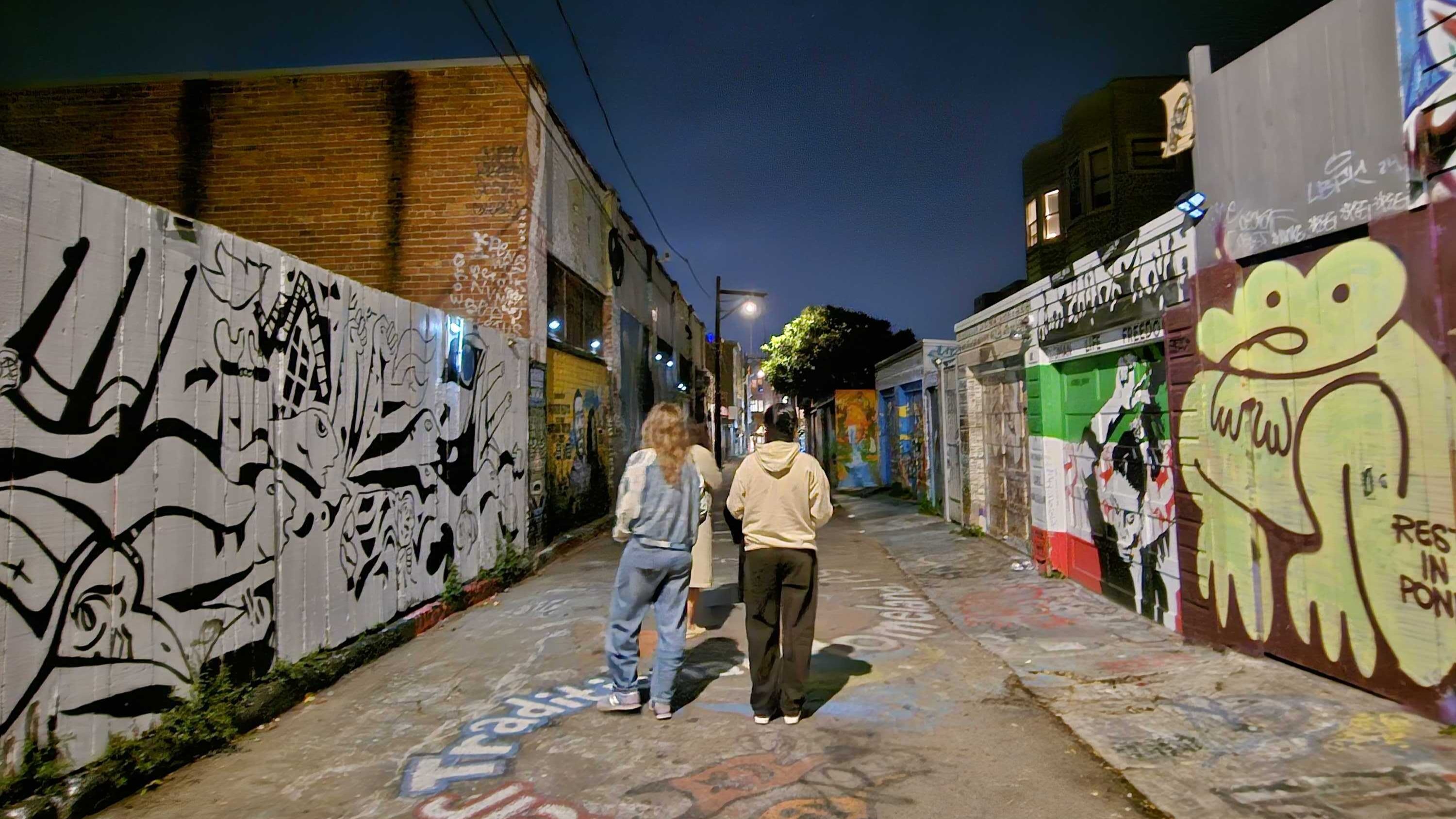
RELAW team walking down an art alleyway in Mission District
What we witnessed at this conference was indeed ‘The Stars’ with plentiful initiatives that are evolving our economies beyond extraction and illustrating what’s possible for conservation, climate and sustainable investments. We shared here only a few examples of the myriad of transformational economic opportunities, initiatives and visions shared over the three days.
In closing, here are two powerful quotes that were shared by two amazing speakers:
“If I have courage, it is because I have faith in the knowledge of my ancestors.” – Mau Piailug, as shared by Keoni Lee, CEO of Hawaiʻi Investment Ready
“We need to take the word ‘surviving’ out of our language and replace it with ‘thriving.’” – Rob Edward, sməlqmíx